
April 16
1867 Birth: Wilbur Wright: American inventor and aviation pioneer.
1886 Birth: Ernst Thaelmann: German politician, leader of the Communist Party of Germany (KPD) during much of the Weimar Republic. He was arrested by the Gestapo in 1933 and held in solitary confinement for eleven years, before being shot on Adolf Hitler's orders in 1944.
1889 Birth: Charlie Chaplin:
With "The Great Dictator" Chaplin joined the sound-picture ranks. A ferocious ridicule of Hitler and Mussolini, the film has grown in stature over the years as its political implications have been, according to critics, more fully realized. "I want to see the return of decency and kindness," Chaplin said at the time. "I'm just a human being who wants to see this country a real democracy . . ."
Despite "The Great Dictator," the nineteen-forties were difficult years for Chaplin. His private life provided a headline festival for the tabloid press; he was vexed by income tax trouble; his wartime speeches calling for a Western second front to crush Hitler irked many conservatives; and "Monsieur Verdoux" did poorly at the box office.
This fugue of troubles was intensified by the advent of the cold war. The actor came under fire for introducing Henry A. Wallace at a rally and for protesting the deportation of Hanns Eisler, the composer and a onetime Communist. Westbrook Pegler, the columnist, denounced him, and Representative John E. Rankin, a right-wing legislator from Mississippi, demanded his deportation. Chaplin's life "is detrimental to the moral fabric of America," Mr. Rankin asserted, urging that he be kept "off the American screen and his loathsome pictures be kept from the eyes of American youth."
Finally, in 1952, the actor, a British subject, was virtually exiled by the United States. While he was sailing to Britain on vacation, the Attorney General announced that he could not re-enter the country unless he could prove his "moral worth." Piqued, Chaplin spent the rest of his life in Europe, settling on a 38-acre estate at Vevey, Switzerland. [For further details, Click here.]
1907 Birth: August Eigruber: Austrian war criminal; the Nazi Gauleiter of Oberdonau (Upper Danube) and Landeshauptmann of Upper Austria.
[See: Austria: The Other Germany.]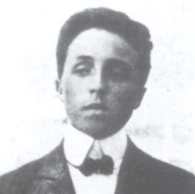
1908 Adolf Hitler's best friend and roommate—August Kubizek—leaves Vienna to spend Easter with his family in Linz.. [For further details, Click here.]
1915 World War I: Various:
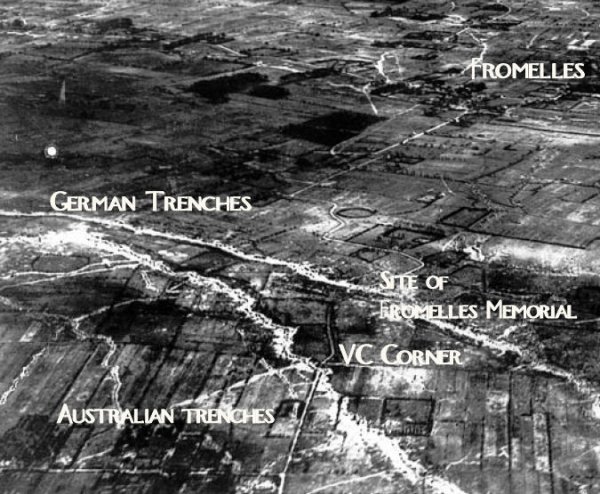
List Regiment: Gefreiter Adolf Hitler's 16 RIR occupy a position, at Fromelles, France, which is on a level field with water channels, willow trees and willow stalks, in the distance towards the enemy lines lie an insignificant wood with barbed wire entanglements. Under the direction of their defense-minded commander, Lieutenant General Gustav Scanzoni von Lichtenfels, the regiment works ceaselessly day and night in the subsequent weeks, to further fortify their position at Fromelles. [For further details, Click here.]
Battle of the Carpathian Passes: From the official report written by the Russian Army Commander-in-Chief Grand Duke Nikolai—the uncle of Tsar Nicholas II: "On April 16th the actions in the Carpathians were concentrated in the direction of Rostoki. The enemy, notwithstanding the enormous losses he had suffered, delivered, in the course of that day, no fewer than sixteen attacks in great strength." [For further details, Click here.]
1916 World War I: List Regiment:
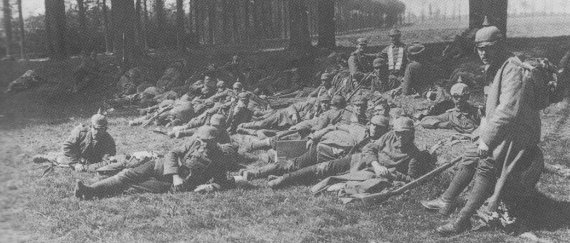
Gefreiter Adolf Hitler endures trench warfare in Flanders (Artois) with 3 Company, 16 Reserve Infantry Regiment. [For further details, Click here.]
1917 World War I: Lenin returns:
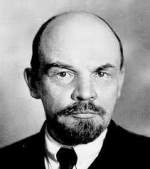
On April 16, 1917, Vladimir Lenin, leader of the revolutionary Bolshevik Party, returns to Petrograd after a decade of exile to take the reins of the Russian Revolution. One month before, Czar Nicholas II had been forced from power when Russian army troops joined a workers' revolt in Petrograd, the Russian capital.
Born Vladimir Ilich Ulyanov in 1870, Lenin was drawn to the revolutionary cause after his brother was executed in 1887 for plotting to assassinate Czar Alexander III. He studied law and took up practice in Petrograd (now St. Petersburg), where he associated with revolutionary Marxist circles. In 1895, he helped organize Marxist groups in the capital into the "Union for the Struggle for the Liberation of the Working Class," which attempted to enlist workers to the Marxist cause. In December 1895, Lenin and the other leaders of the Union were arrested. Lenin was jailed for a year and then exiled to Siberia for a term of three years.
After the end of his exile, in 1900, Lenin went to Western Europe, where he continued his revolutionary activity. It was during this time that he adopted the pseudonym Lenin. In 1902, he published a pamphlet titled What Is to Be Done? which argued that only a disciplined party of professional revolutionaries could bring socialism to Russia. In 1903, he met with other Russian Marxists in London and established the Russian Social-Democratic Workers' Party (RSDWP). However, from the start there was a split between Lenin's Bolsheviks (Majoritarians), who advocated militarism, and the Mensheviks (Minoritarians), who advocated a democratic movement toward socialism. These two groups increasingly opposed each other within the framework of the RSDWP, and Lenin made the split official at a 1912 conference of the Bolshevik Party.
After the outbreak of the Russian Revolution of 1905, Lenin returned to Russia. The revolution, which consisted mainly of strikes throughout the Russian empire, came to an end when Nicholas II promised reforms, including the adoption of a Russian constitution and the establishment of an elected legislature. However, once order was restored, the czar nullified most of these reforms, and in 1907 Lenin was again forced into exile.
Lenin opposed World War I, which began in 1914, as an imperialistic conflict and called on proletariat soldiers to turn their guns on the capitalist leaders who sent them down into the murderous trenches. For Russia, World War I was an unprecedented disaster: Russian casualties were greater than those sustained by any nation in any previous war. Meanwhile, the economy was hopelessly disrupted by the costly war effort, and in March 1917 riots and strikes broke out in Petrograd over the scarcity of food. Demoralized army troops joined the strikers, and on March 15 Nicholas II was forced to abdicate, ending centuries of czarist rule. In the aftermath of the February Revolution (known as such because of Russia's use of the Julian calendar), power was shared between the ineffectual Provincial Government and the soviets, or "councils," of soldiers' and workers' committees.
After the outbreak of the February Revolution, German authorities allowed Lenin and his lieutenants to cross Germany en route from Switzerland to Sweden in a sealed railway car. Berlin hoped (correctly) that the return of the anti-war Socialists to Russia would undermine the Russian war effort, which was continuing under the Provincial Government. Lenin called for the overthrow of the Provincial Government by the soviets, and he was condemned as a "German agent" by the government's leaders. In July, he was forced to flee to Finland, but his call for "peace, land, and bread" met with increasing popular support, and the Bolsheviks won a majority in the Petrograd soviet. In October, Lenin secretly returned to Petrograd, and on November 7 the Bolshevik-led Red Guards deposed the Provisional Government and proclaimed soviet rule.
Lenin became the virtual dictator of the world's first Marxist state. His government made peace with Germany, nationalized industry, and distributed land but, beginning in 1918, had to fight a devastating civil war against czarist forces. In 1920, the czarists were defeated, and in 1922 the Union of Soviet Socialist Republics (USSR) was established. Upon Lenin's death in early 1924, his body was embalmed and placed in a mausoleum near the Moscow Kremlin. Petrograd was renamed Leningrad in his honor. After a struggle of succession, fellow revolutionary Joseph Stalin succeeded Lenin as leader of the Soviet Union. (History.com)
List Regiment: Gefreiter Adolf Hitler's 16 Reserve Infantry Regiment, 3 Company, fortify trenches near Arras. [For further details, Click here.]
Second Battle of the Aisne River—in northern France—begins when commander Robert Nivelle launches an offensive. The French armies attack on a 40-mile front between Soissons and Reims to take the Chemin des Dames, a series of rocky, wooded ridges running parallel to the front. The Germans, fully aware of French plans as a result of Nivelle's confident public boasts, turn the assault into a disaster. The entire operation is a colossal failure, costing the French nearly 120,000 men in 5 days.
1918 World War I: List Regiment: Gefreiter Adolf Hitler's 16th RIR constructs fortified works in difficult defensive positions on an active front with German assault regiments near Fountaine (Montdidier). [For further details, Click here.]
1922 Treaty of Rapallo: under which Germany recognizes the Soviet Union and diplomatic and trade relations are restored. Note: A secret annex will be signed on July 29 allowing Germany to train their military in Soviet territory, in violation of the Treaty of Versailles.
The German Reich and the Russian Socialist Federal Soviet Republic mutually agree to waive their claims for compensation for expenditure incurred on account of the war, and also for war damages, that is to say, any damages which may have been suffered by them and by their nationals in war zones on account of military measures, including all requisitions in enemy country. Both Parties likewise agree to forego compensation for any civilian damages, which may have been suffered by the nationals of the one Party on account of so-called exceptional war measures. [For further details, Click here.]
1937 Holocaust: Refugees: Swiss officials announce that they are refusing to grant permanent resident permits to German Jewish refugees to avoid flooding the labor market. (THP)
1938 Britain signs a pact of friendship with Italy without giving adequate notice to the United States. (THP)
1939 Spain:

After Franco, with the help of Hitler and Mussolini, had successfully defeated the "Loyalists," Pope Pius XII this day sends the Spanish Catholics his expressions of "immense joy" and "fatherly congratulations for the gift of peace and victory with which God has deigned to crown the Christian heroism of your faith and charity, proved through such great and generous sufferings." (THP)
1941 Holocaust: Various:
Balkans: German troops enter Sarajevo and demolish the main Jewish synagogue. A few Jews escape over the mountains into Italian occupied territory, but the majority of Bosnian Jews are soon deported to concentration camps controlled by the Fascist Croatian "Ustachi." Nearly all will die. (THP)
The Italian convoy Duisburg—directed to Tunisia—is attacked and destroyed by British ships.
Holocaust: France: At Suresnes, outside Paris, the first executions of Jews in the resistance takes place. During 1941, a total of 133 Jews are shot for resistance in France, according to Gestapo records. (THP)
1942 Holocaust: Various:
Crimea: Berlin is informed by the local SS that "the Crimea is purged of Jews." (THP)
Holocaust: Poland: 2,000 Jews from Gostynin are deported to Chelmno (Kulmhof) for execution. (THP)
1943 World War II: Various:
From the minutes of a press conference in the Propagandaabteilung:
At the end of the conference the German commentator declared that on Tuesday, 20 April (the Fuehrer's birthday) the newspapers would consist of four pages instead of two, and on Wednesday, 21 April, they would consist of two pages instead of four. He asked the reporters present to stress the European orientation of the Fuehrer's political personality and to treat Franco-German relations very generously. A great deal of tact and reserve are necessary, however, in order not to give the newspapers the appearance of being no longer French, and in this way shocking public opinion.
Katyn Massacre: The Polish government in exile in London asks for a Red Cross investigation of the mass murders in the Katyn Forest.
1944 World War II: Bombing: Allied bombing of Germany had reduced many German cities to ruins by April 1944, but had not succeeded in stopping the German war effort. Here Goebbels addresses the damage caused by the bombing, and hints at the coming V-weapons:
We cannot help loving the city of Berlin more today than ever before, even with its heavy wounds. After another night of bombing, public transportation may not be working. We see a stream of men and women walking through the wide avenues for two or three hours to reach their workplaces. The men are unshaven and rumpled. The women may be wearing pants and a simple pullover, carrying a small suitcase with the essentials under their arms. Such a sight makes us appreciate this brave city. [For further details, Click here.]
1945 World War II: Various:

The German ship Goya—overfilled with refugees—sinks after being torpedoed by a Soviet submarine, killing more than 7,000 people.
[See: The Last Days of the Third Reich.]Halifax (Washington) to Churchill:
Anthony and I saw Harry Hopkins this morning . . . . He had not been greatly surprised by the President's death, and was thankful he had not had a stroke and lost power like Wilson. For some time he had noticed how much the President had failed. He had been able to do only very little work. He judged the President's death to have created a completely new situation in which we should be starting from scratch. One thing we would be certain of would be that the policy would be very much more the concerted action of the Senate. How this would work it was quite impossible to predict . . . . It may be of interest that Truman's hobby is history of military strategy, of which he is reported to have read widely.
Eden to Churchill:

Edward and I paid our first call on the President this morning. He made a good impression . . . . My impression from the interview is that the new President is honest and friendly. He is conscious of but not overwhelmed by his new responsibilities. His references to you could not have been warmer. I believe we shall have in him a loyal collaborator, and I am much heartened by this first conversation.
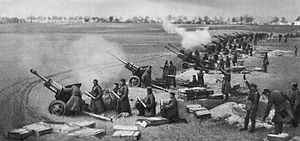
General Zhukov launches his final attack on Berlin:
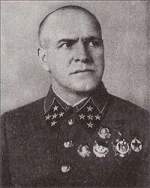
Zhukov's 1st Byelorussian Front attacked at 05.00 on the 16th April and Koniev's 1st Ukrainian Front at 06.15. Although Koniev's attack across the River Neisse went well, Zhuvok's forces soon ran into trouble. The battle just west of the River Oder proved to be no walkover as the Seelow Heights were a critical defensive position in Army Group Vistula's sector, and the Germans, under no illusions as to what a Soviet breakthrough would mean, fought desperately. The Army Group had been under Col Gen G. Heinrici since the end of March after Hitler replaced Himmler with Heinrici, a veteran of the Eastern Front and expert on defensive tactics. He had pulled his men back from the forward positions just before the start of the attack and thus the artillery bombardment hit only empty positions while the searchlights merely lit up the Soviet tanks and infantry for the German gunners to rake with murderous fire. Stalin was furious at the delay, as well as Zhukov's attempt to overcome it with the deployment of his mobile reserves, the 1st and 2nd Guards Tank Armies that contravened Stavka's (the Soviet High Command) orders. After fierce fighting, Zhukov overcame the positions on the Seelow Heights but because of German reinforcements (Col Gen Helmuth Weidling's LVI Panzer Corps) still found the going tough. As a result, Stalin ordered Koniev to direct his armoured forces directly at Berlin with the result that two Soviet Fronts were advancing for the city. [For further details, Click here.]
Mikolajczryk to Churchill:
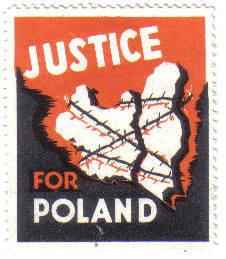
1. I consider close and lasting friendship with Russia is the keystone of future Polish policy, within the wider friendship of the United Nations.
2. To remove all doubt as to my attitude, I wish to declare that I accept the Crimea decision in regard to the future of Poland, its sovereign independent position, and the formation of a Provisional Government representative of National Unity.
3. I support the decision arrived at in the Crimea that a conference of leading personalities be called with a view to constituting a Government of National Unity, as widely and fairly representative of the Polish people as possible, and one which will command recognition by the three major Powers.
President Harry S. Truman: In his first speech to Congress, Truman pledges to carry out the war and peace policies of his late predecessor, President Franklin D. Roosevelt.

So that there can be no possible misunderstanding, both Germany and Japan can be certain, beyond any shadow of a doubt, that America will continue the fight for freedom until no vestige of resistance remains! We are deeply conscious of the fact that much hard fighting is still ahead of us. Having to pay such a heavy price to make complete victory certain, America will never become a party to any plan for partial victory! To settle for merely another temporary respite would surely jeopardize the future security of all the world. Our demand has been, and it remains-Unconditional Surrender! We will not traffic with the breakers of the peace on the terms of the peace. The responsibility for making of the peace-and it is a very grave responsibility-must rest with the defenders of the peace. We are not unconscious of the dictates of humanity. We do not wish to see unnecessary or unjustified suffering. But the laws of God and of man have been violated and the guilty must not go unpunished. Nothing shall shake our determination to punish the war criminals even though we must pursue them to the ends of the earth. Lasting peace can never be secured if we permit our dangerous opponents to plot future wars with impunity at any mountain retreat - however distant. In this shrinking world, it is futile to seek safety behind geographical barriers. Real security will be found only in law and in justice. [For the full text, Click here.]
Last Days: As the Soviets near Berlin and the Americans enter Nuremberg, Hitler addresses what is left of his forces:

The Jewish Bolshevik arch-enemy has gone over to the attack with his masses for the last time. He attempts to smash Germany and to eradicate our nation. You soldiers from the east today already know yourselves to a large extent what fate is threatening, above all, German women, girls and children. While old men and children are being murdered, women and girls are humiliated to the status of barracks prostitutes. Others are marched off to Siberia. We have anticipated this thrust, and since January of this year everything has been done to build up a strong front. Mighty artillery is meeting the enemy. Our infantry's casualties were replenished by countless new units. Reserve units, new formations and the Volkssturm reinforce our front. This time the Bolsheviks will experience Asia's old fate. That is, he must and will bleed to death. [For the full text, Click here.]
[See: Why Did Hitler Insist on No Surrender?]From Albert Speer's testimony before the IMT:
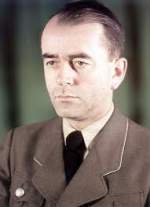
It was said that military protection against the East would have been necessary to protect refugees. In reality, until the middle of April 1945, the bulk of our last reserves of armored vehicles and munitions were used for the fight against the West. The tactical principle, therefore, was different from the one it should have been if the fight had been carried out with the aims which have been stated here. The destruction of bridges in the West and the destruction orders against the basis of life of the nation show the opposite. The sacrifices which were made on both sides after January 1945 were senseless. The dead of this period will be the accusers of the man responsible for the continuation of that fight, Adolf Hitler. The same is true of the ruined cities, which in this last phase had to lose tremendous cultural values and where innumerable dwellings suffered destruction. Many of the difficulties under which the German nation is suffering today are due to the ruthless destruction of bridges, traffic installations, trucks, locomotives, and ships. The German people remained loyal to Adolf Hitler until the end. He betrayed them with intent. He tried to throw them definitely into the abyss.
Colditz
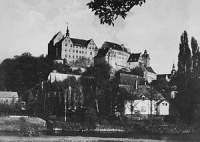
The United States Army liberates Nazi Sonderlager (high security) Prisoner of War camp Oflag IVc (Colditz Castle). US troops also reach the outskirts of Nuremberg, Germany.
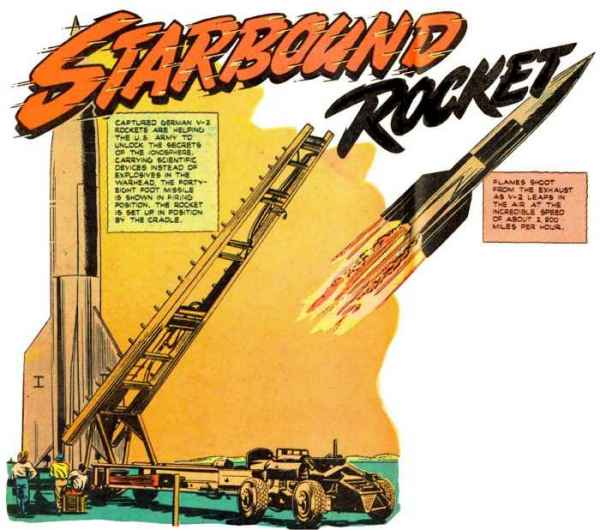
1946 Wunderwaffen: For the first time in the United States (at White Sands), a captured German V-2 rocket undergoes a test flight. (Braun)
[See: Wunderwaffen: Hitler's Deception and the History of Rocketry.]1947 Various:
Bernard Baruch coins the term "Cold War":
Multimillionaire and financier Bernard Baruch, in a speech given during the unveiling of his portrait in the South Carolina House of Representatives, coins the term "Cold War" to describe relations between the United States and the Soviet Union. The phrase stuck, and for over 40 years it was a mainstay in the language of American diplomacy. [For further details, Click here.]
1947 Death: Rudolf Hoess: commandant of the Auschwitz concentration camp:
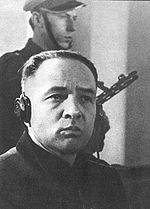
Another improvement we made over Treblinka was that we built our gas chambers to accommodate 2,000 people at one time, whereas at Treblinka their 10 gas chambers only accommodated 200 people each. The way we selected our victims was as follows: we had two SS doctors on duty at Auschwitz to examine the incoming transports of prisoners. The prisoners would be marched by one of the doctors who would make spot decisions as they walked by. Those who were fit for work were sent into the Camp. Others were sent immediately to the extermination plants. Children of tender years were invariably exterminated, since by reason of their youth they were unable to work. Still another improvement we made over Treblinka was that at Treblinka the victims almost always knew that they were to be exterminated and at Auschwitz we endeavored to fool the victims into thinking that they were to go through a delousing process. Of course, frequently they realized our true intentions and we sometimes had riots and difficulties due to that fact. Very frequently women would hide their children under the clothes but of course when we found them we would send the children in to be exterminated. We were required to carry out these exterminations in secrecy but of course the foul and nauseating stench from the continuous burning of bodies permeated the entire area and all of the people living in the surrounding communities knew that exterminations were going on at Auschwitz.
[See: How Widespread Was Guilty Knowledge of the Holocaust?]1948 The Organization for European Economic Cooperation is set up in Paris.
1955 Wunderwaffen: The Soviet Government announces that a permanent high-level, interdepartmental commission for interplanetary communications has been created in the Astronomic Council of the USSR Academy of Sciences. A group of Russia's top scientists is now officially working on a satellite program.
1962 Music: Bob Dylan debuted his song "Blowin' in the Wind" at Gerde's Folk City in New York. (AP)
1978 Death: Lucius Clay:
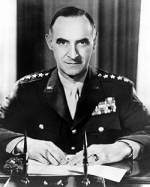
American general and military governor best known for his administration of Germany immediately after World War II. Clay is remembered as a hero for ordering and maintaining the airlift (Berlin Crisis), which would ultimately last 324 days, through May of 1949. He resigned his post days after the blockade was lifted. After Clay retired from the military, he went into politics and served several presidents. [For further details, Click here.]
Edited by Levi Bookin (Copy editor)
levi.bookin@gmail.com



Click to join 3rdReichStudies


Please note that the list-owner and the moderator are not responsible for, and do not necessarily approve of, the random ads placed on our pages by our web server. They are, unfortunately, the price one pays for a 'free' website.
FAIR USE NOTICE: This site may contain copyrighted material the use of which has not always been specifically authorized by the copyright owner. We are making such material available in our efforts to advance understanding of historical, political, human rights, economic, democracy, scientific, environmental, and social justice issues, etc. We believe this constitutes a 'fair use' of any such copyrighted material as provided for in section 107 of the US Copyright Law. In accordance with Title 17 U.S.C. Section 107, the material on this site is distributed without profit to those who have expressed a prior interest in receiving the included information for research and educational purposes. If you wish to use copyrighted material from this site for purposes of your own that go beyond 'fair use', you must obtain permission from the copyright owner.